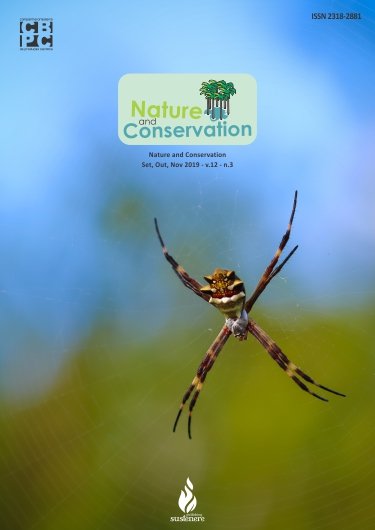Birdlife hosted in the CETAS/IBAMA in Rio Grande do Norte and Paraíba States, Brazil
DOI:
https://doi.org/10.6008/CBPC2318-2881.2019.003.0001Keywords:
Birds, Illegal Trade, MonitoringAbstract
The illegal commercialization of wild animals is a disseminated process all over the world. In Brazil this illegal practice, based on the removal of wild animals from nature, has become one of the main sources of the fauna’s smuggling. For representing one of the vertebrate groups of great synergetic importance in the world, especially due to its economic and sociocultural relevance, the birds are the animals which suffer the most with the clandestine smuggling. This study was made aiming to characterize the illegal trade of wild birds based on the registered data from the CETAS (Wild Animal Sorting Centres) of IBAMA in two areas in the Brazil’s Northeast – Rio Grande do Norte and Paraíba. The data collection took place from March 2014 to January 2015, through the database query provided by CETAS-RN and CETAS-PB. The information was qualified between the 2005 and 2014, relating to the entrance of seized or voluntarily handed over birds by the local population. One can estimate that there was an increase of wild animal’s smuggling due to: the reduction on the species receipt in the CETAS of both States; the lack of investments and absence of destination for those animals. There was prevalence of birds among seized and handed over groups, standing out the Passeriformes and Psittaciformes. The most seized species were the Sicalis flaveola (canary), Paroaria dominicana (red-cowled cardinal) and Cyanoloxia brissonii (ultramarine grosbeak). During the analysed years the more frequent endemic species of caatinga were: P. dominicana (red-cowled cardinal), Eupsittula cactorium (cactus parakeet) e Sporophila albogularis (white-throated seedeater).
Downloads
Downloads
Published
Issue
Section
License
The CBPC - Companhia Brasileira de Produção Científica (Brazil CNPJ: 11.221.422/0001-03) the material rights of the published works. The rights relate to the publication of the work anywhere in the world, including rights to renewals, expansions and dissemination of the contribution, as well as other subsidiary rights. All electronically published works may subsequently be published in printed collections under the coordination of this company and / or its partners. The authors preserve the copyright, but are not allowed to publish the contribution in another medium, printed or digital, in Portuguese or in translation.









